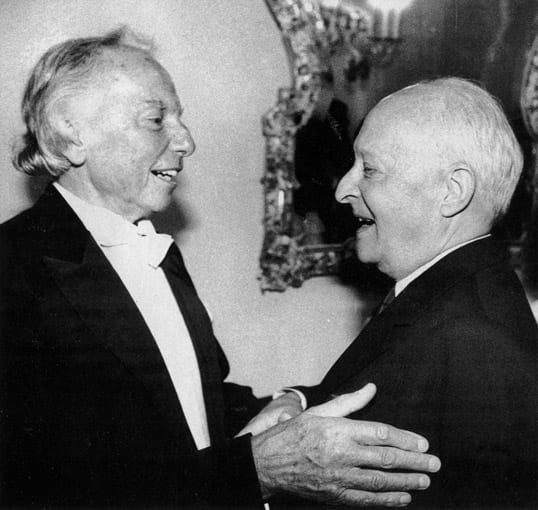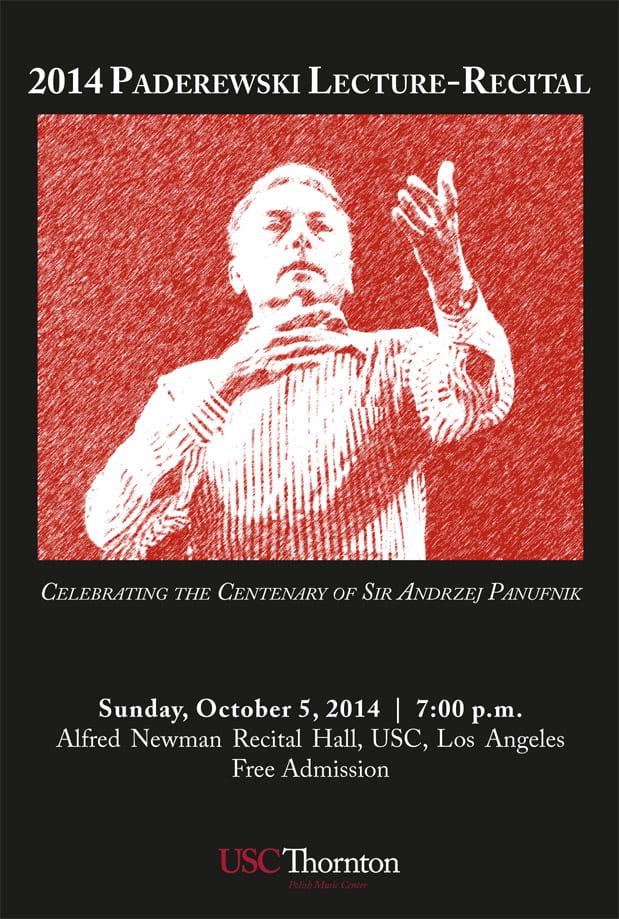
Last year, the entire world celebrated Witold Lutosławski’s centenary. As soon as the calendar had turned to 2014, the centennial celebrations shifted to another major figure in Polish music. While Lutosławski and his music have always been known far and wide, Andrzej Panufnik has remained on the peripheries of Polish musical life for many decades. It was a curious and fascinating twist of fate, because Panufnik was Lutosławski’s close friend and chamber music partner in Warsaw during the dark years of World War II and, in the early years of the Polish People’s Republic, Panufnik was its rising star, both as a composer and conductor.
Born in Warsaw on September 24, 1914, Panufnik studied music at the Warsaw Conservatory, majoring in theory and composition. During the years 1937-1939, he studied conducting in Vienna with Felix Weingartner, one of the most respected maestros of the era. Thus, from the beginning of his musical career, Panufnik was recognized as much for compositions as he was for his guest conducting appearances with the most prestigious European orchestras.
Returning to Poland on the eve of World War II, Panufnik spent the years of German occupation in Warsaw. He composed and performed in many concerts—some official, some underground—and, in order to earn a living, teamed up with Witold Lutosławski for piano duet appearances in various Warsaw cafes. In fact, during the years 1940-1944, the Lutosławski-Panufnik duo presented a repertoire of about 200 works—mostly arrangements of well-known classical music from Bach to Tchaikovsky. Lutosławski’s Variations on a Theme by Paganini for Two Pianos (1941) were one of the original works premiered by the duet at the Aria Café in occupied Warsaw.
Most of Panufnik’s compositions were lost after the brutal suppression of the 1944 Warsaw Uprising. His early post-war musical activities in Poland centered on rebuilding the orchestras in Kraków and Warsaw, leading various orchestras across Europe as a guest conductor, and trying to reconstruct from memory several of his compositions that were destroyed during the war.
After winning several competitions for composers and receiving a Banner of Labor Medal, First Class, from Poland’s president, Bolesław Bierut in 1949, Panufnik was recognized as a leading composer of the day. He also became a deputy director of the newly-created Polish Composers’ Union (ZKP) and travelled with official delegations to Moscow and Beijing. But, as Panufnik tried to remain politically neutral, the authorities gradually began to criticize his music for its purported “formalist tendencies” and it was withdrawn from concert performances. During a 1954 conducting engagement in Switzerland, Panufnik managed to evade his ever-present Polish secret service agents and reach the Zurich airport without being tailed. There, here boarded a flight to London and instantly applied for political asylum in Britain. Coming at the height of the Cold War, Panufnik’s escape created an international crisis. Polish communist authorities were furious, declared him a traitor, and sought to extradite Panufnik to Poland. Although they did not succeed in bringing him to trial in Poland, Panufnik’s music was banned in Poland and all of his published compositions were withdrawn from circulation. In spite of his high international standing as a composer and conductor, Panufnik ceased to exist as far as Polish government was concerned and the ban on his music was lifted only in 1977.

in their family home in Twickenham
Panufnik settled in England, married his second wife, Camilla, started a family, and gradually rebuilt his career as a composer and conductor. Many distinguished musicians, including Witold Małcużyński, Leopold Stokowski, Yehudi Menuhin, Sir Georg Solti, and Mstislav Rostropovich continued to champion Panufnik by commissioning and performing his music. He was also recognized with prizes for composition by Prince Pierre of Monaco, he received the Sibelius Centenary Medal, and he continued to guest conduct many of the world’s leading orchestras. After a democratic government was installed in Poland, Panufnik was finally able to return to Poland in 1990. For his lifetime achievement in music, he was knighted by Her Majesty, Queen Elizabeth II in January 1991. He died of cancer in London on 27 October 1991.
Throughout this year, Panufnik’s music once again resonates in concert halls across Europe, North America, Asia and Australia. Much of the energy behind this revival is thanks to Lady Camilla Panufnik, whose tireless advocacy of her late husband’s music brought about a number of concerts that certainly add up to an erstwhile Panufnik resurgence.
 During this centenary year celebration, the Polish Music Center is organizing two concerts honoring Panufnik at USC. The first is the annual Paderewski Lecture-Recital on Sunday, October 5, highlighting Panufnik’s chamber music. Our featured guest, Lady Camilla Panufnik, will deliver the annual Paderewski Lecture, entitled “Andrzej Panufnik—the Man behind the Music.” Her personal reminiscences will be interspersed with little-known photographs of her husband, his family and friends. A concert of Panufnik’s more intimate works will follow with performers including mezzo-soprano Juliana Gondek and the Eclipse String Quartet, as well as other guest artists.
During this centenary year celebration, the Polish Music Center is organizing two concerts honoring Panufnik at USC. The first is the annual Paderewski Lecture-Recital on Sunday, October 5, highlighting Panufnik’s chamber music. Our featured guest, Lady Camilla Panufnik, will deliver the annual Paderewski Lecture, entitled “Andrzej Panufnik—the Man behind the Music.” Her personal reminiscences will be interspersed with little-known photographs of her husband, his family and friends. A concert of Panufnik’s more intimate works will follow with performers including mezzo-soprano Juliana Gondek and the Eclipse String Quartet, as well as other guest artists.
The second USC concert, on October 9, will feature two of Panufnik’s orchestral works: his Tragic Overture (a wartime composition) and Harmony (a work composed for his 25th wedding anniversary). This program will be presented by maestro Carl St. Clair and the Thornton Symphony Orchestra at Bovard Auditorium. Admission to both events is free and we hope a large segment of Polish community in Southern California will be able to attend both of these exciting events.
SUNDAY, OCTOBER 5, 2013 | 7:00 P.M.
2014 Paderewski Lecture-Recital – Celebrating Sir Andrzej Panufnik
USC Alfred Newman Recital Hall (AHF)
3616 Trousdale Pkwy, Los Angeles, CA
Info: 213. 821.1356 | polmusic@thornton.usc.edu
THURSDAY, OCTOBER 9 | 7:30 P.M.
USC Thornton Symphony Performs Panufnik
USC Bovard Auditorium (ADM)
3551 Trousdale Parkway, Los Angeles, CA
Info: muspub@usc.edu
Admission for both events: FREE
Parking: $10
Enter USC Gate #3 at McCarthy Way & Figueroa St (Parking Structure X)